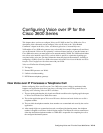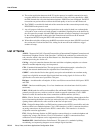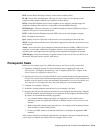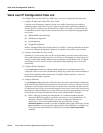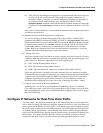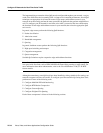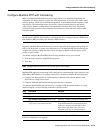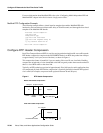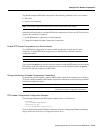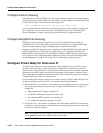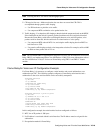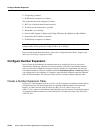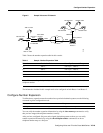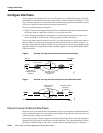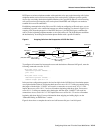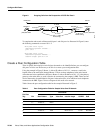
Configuring Voice over IP for the Cisco 3600 Series VC-13
Configuring Voice over IP for the
Cisco 3600 Series
This chapter shows you how to configure Voice over IP (VoIP) on the Cisco 3600 series. For a
description of the commands used to configure Voice over IP, refer to the “Voice-Related
Commands” chapter in the Voice, Video, and Home Applications Command Reference.
VoIP enables a Cisco 3600 series router to carry voice traffic (for example, telephone calls and faxes)
over an IP network. Voice over IP is primarily a software feature; however, to use this feature on a
Cisco 3600 series router, you must install a voice network module (VNM). The VNM can hold either
two or four voice interface cards (VICs), each of which is specific to a particular signaling type
associated with a voice port. For more information about the physical characteristics, installing or
configuring a VNM in your Cisco 3600 series router, refer to the Voice Network Module and Voice
Interface Card Configuration Note that came with your VNM.
Voice over IP offers the following benefits:
• Toll bypass
• Remote PBX presence over WANs
• Unified voice/data trunking
• POTS-Internet telephony gateways
How Voice over IP Processes a Telephone Call
Before configuring Voice over IP on your Cisco 3600 series router, it helps to understand what
happens at an application level when you place a call using Voice over IP. The general flow of a
two-party voice call using Voice over IP is as follows:
1 The user picks up the handset; this signals an off-hook condition to the signaling application part
of Voice over IP in the Cisco 3600 series router.
2 The session application part of Voice over IP issues a dial tone and waits for the user to dial a
telephone number.
3 The user dials the telephone number; those numbers are accumulated and stored by the session
application.
4 After enough digits are accumulated to match a configured destination pattern, the telephone
number is mapped to an IP host via the dial plan mapper. The IP host has a direct connection to
either the destination telephone number or a PBX that is responsible for completing the call to
the configured destination pattern.



